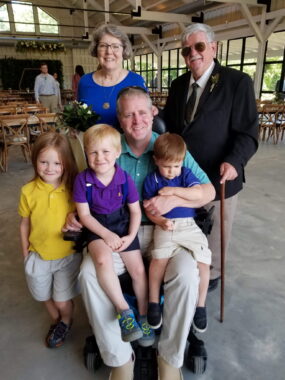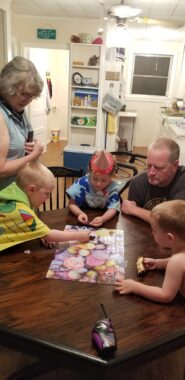A mother’s perspective on MS: Accepting help is hard to do
Written by |


Sheila Hofmeister and her husband, Rick, stand behind the wheelchair of their son Ben Hofmeister, whose three sons, Sterling, Jule, and Monte, are pictured from left to right. (Photos courtesy of Ben Hofmeister)
Day 30 of 31
This is Sheila Hofmeister’s story:
Note: Multiple Sclerosis News Today columnist Ben Hofmeister recently interviewed his mother, Sheila Hofmeister, regarding her reaction to his multiple sclerosis (MS) diagnosis and the changes she’s seen in the years since. Their Q&A follows:

Hofmeister and her son Ben look on as his three children, from left to right, Sterling, Jule, and Monte, work on a puzzle together. Ben Hofmeister’s rollator is in the background.
BH: I can’t remember how long after my diagnosis I told you I had MS. Do you remember?
SH: You called within a day or two of the MS diagnosis to give your father and me the news. I remember you saying that what you had to tell us was not something you wanted to put in a text, but something you felt you had to tell us directly.
What did you think about the news at the time?
In a word, I thought it was unfair. After a lifetime of taking risks, it just seemed wrong that you were being affected by a disease that could happen to anyone.
Did you know anyone else with MS? Did you think I’d be just like them? Because, to be honest, that’s what I thought.
I had a teacher in junior high school in the early ’60s who was diagnosed with MS. But people didn’t talk about it like they do now. She seemed fine, but no one knew what her life at home was like. I saw her again at a funeral when she was in her 80s. By then, she was in a wheelchair and her husband was feeding her, but I think I associated that with her age, not MS.
Not long after your diagnosis, I spoke with another lady who was organizing a walk for a mass event, and she had a limp and used a cane, but otherwise seemed fine. At the time, I hoped and prayed your MS would never get past that point.

Sheila Hofmeister poses for a photo at Disney World with her son Ben, who hides his cane behind him, and grandson Monte.
When did it dawn on you that I was progressing?
The whole family was together at St. George Island in Florida. You were using a cane at the time, but when you got to the sand, you just kept falling. That killed me because I remember thinking it was getting worse.
A couple of years later, you were using a manual wheelchair upstairs at the family beach house. I remember pushing you and having memories of pushing you in a baby stroller. Probably because both times, you didn’t want any help.
In the past couple of years, Dad had a stroke and you’ve had a battle with cancer, so you’ve had difficulties of your own. I feel like I should be asking your advice.
I had a lot of help at the beginning, and when I was going through chemo, but now I’m on my own. That’s given me a lot of sympathy for caregivers. I feel like I do everything twice — once for me, once for your father. Both asking for help and accepting it are difficult. You just have to laugh about it sometimes. The worst thing you can do is to stop talking to each other. Communication is everything.
In recognition of Multiple Sclerosis Awareness Month in March, the MS Community Spotlight campaign features a series of stories highlighting the real-life experiences of people affected by MS, written in their own words. Follow us on Facebook, Instagram, X, and Pinterest for more stories like this, using the hashtag #MSSpotlight, or read the full series.


